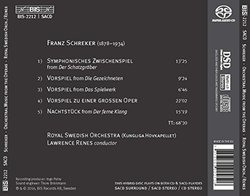| All Artists: Royal Swedish Orchestra Title: Franz Schreker: Orchestral Music from the Operas Members Wishing: 0 Total Copies: 0 Label: BIS records Release Date: 10/14/2016 Album Type: Hybrid SACD - DSD Genres: Classical, Latin Music Style: Number of Discs: 1 SwapaCD Credits: 1 |
Search - Royal Swedish Orchestra :: Franz Schreker: Orchestral Music from the Operas
 | Royal Swedish Orchestra Franz Schreker: Orchestral Music from the Operas Genres: Classical, Latin Music Following the première of the opera Der ferne Klang in Frankfurt in 1912, Franz Schreker (18781934) became regarded as one of the most eminent composers of his time. His operas with their symbolist, often erotic subje... more » |
Larger Image |
CD Details
Synopsis
Product Description
Following the première of the opera Der ferne Klang in Frankfurt in 1912, Franz Schreker (18781934) became regarded as one of the most eminent composers of his time. His operas with their symbolist, often erotic subjects and their sumptuous sonorities were triumphantly successful, and he was regarded as one of the most prominent representatives of New Music Arnold Schoenberg even called him one of the foremost among us. From the 1930s and onwards an almost complete oblivion descended on his music, however, and it is only during the past few years that it is being heard with any frequency again. One reason for this neglect is the fact that Schreker, like many other composers, found himself out of step with the musical developments during the 1920s, but equally important is probably the Nazi persecution that he suffered, being of Jewish descent. Schreker composed almost exclusively operas, and to almost all of these he wrote his own librettos. In this way he could make sure that his subjects were suitable for a musical treatment indeed that they demanded such a treatment. In several of his works music plays an important part in the plot itself in both Das Spielwerk and Der Schatzgräber a magic instrument plays a pivotal role, and in Der ferne Klang the elusive distant sound that the composer Fritz searches for so desperately is a symbol of true love. It is therefore not surprising that the orchestral sections of Schrekers operas are of greater importance for the work as a whole than what is the case with many other composers. Often presenting them as independent pieces in concert, Schreker lavished his striking gifts as an orchestrator on them, creating shimmering, glittering and impassioned works of art, performed here by the Royal Swedish Orchestra, of the Royal Opera in Stockholm, under its chief conductor Lawrence Renes.


![Transcendental - Daniil Trifonov Plays Franz Liszt [2 CD]](https://nationalbookswap.com/cd//m/05/7005/13347005.jpg)




